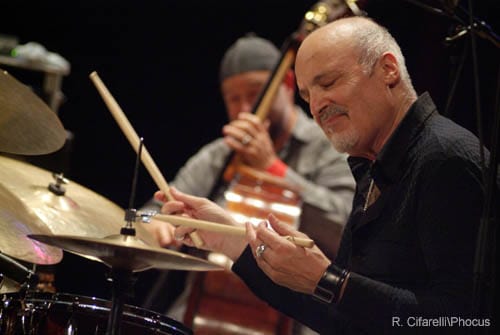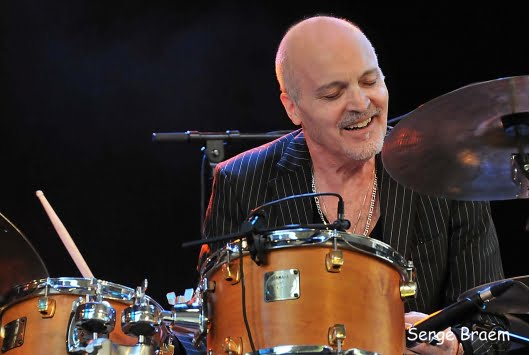16.01. – Happy Birthday !!! Aldo Romano was born in France in 1941, the son of Italian immigrants. His first instrument was the guitar, but he decided to switch to drums in 1961. Essentially self-taught, he nonetheless benefited from the advice of Michel Babault and Jacques Thollot. He admired Philly Joe Jones, Elvin Jones, Tony Williams, Ed Blackwell, and Billy Higgins.
Alto sax player Jackie McLean took notice of him and they played together on one of the McLean’s Parisian sojourns. He met Jean-François Jenny-Clark around the same time and the two became inseparable for a long period. Both were hired by Bernard Vitet who formed, in 1964 with François Tusques one of the first European free jazz groups.
For several years starting from this period, Sunny Murray was one of his most direct influences. He met Don Cherry as well as Gato Barbieri with whom he played regularly. Along with those two, and with Enrico Rava and Steve Lacy, he took part in the recording New Feelings, under the direction of Giorgio Gaslini. He worked at the same time with a number of musicians belonging to the same musical movement, notably Barney Wilen, Michel Portal, and Lacy, as well as with less avant-garde players like Eddy Louiss, Jean-Luc Ponty, Phil Woods, or Charles Tolliver. He met Joachim Kühn and worked regularly with him for several years, recording with him in 1967 Transfiguration and Impressions Of New York during a trip to the United States when Joachim and Rolf Kühn’s quartet played at the Newport Festival. Like Kühn and Wilen, he quickly became interested in the possibilities of combining a free-jazz aesthetic with the motoric rhythms of rock. That perspective gave birth to several albums on which Romano played an essential role: Dear Prof Leary by Barney Wilen (1968) is the best example. In l969, a particularly fertile year, he recorded with Kühn (Sounds Of Feelings), Portal, and Lacy. He met Keith Jarrett, with whom he would work for a time. With Henri Texier, flutist Chris Hayward, and guitarist Georges Locatelli, Romano formed Total Issue, an interesting take on fusion music in which Romano unveiled a new facet of his talent” in addition to drumming, he sang.
While pursuing the Total Issue experiment, which really got started at the beginning of 1970 and led to a record, he also played in Ponty’s group, where he met Philip Catherine (1971). Total Issue finally disbanded in the absence of commercial success. Romano then devoted himself essentially to being a sideman for various French and American musicians, often in the company of Jenny-Clark. He toured with Keith Jarrett in 1969/1970 and remained friends with him. In 1974, he met Charlie Mariano and keyboard specialist Jasper Van’t Hoff. With them he formed Pork Pie, along with Philip Catherine and Henri Texier, who was soon replaced by Jenny-Clark. In 1977, he got back together with Enrico Rava, who hired him and Jenny-Clark for the quartet that he formed with Roswell Rudd.
When that group visited Rome, he recorded an album of duos with Jenny-Clark devoted to Italian poet Cesare Pavese. This strange and exceptional album also featured a speaker who recited the Italian writer’s texts. In 1978, he began recording for the Parisian label Owl; in 1979, he collaborated with Jenny-Clark, Michel Portal, and Claude Barthélemy. In 1980, Night Diary featured American saxophonist Bob Malik, violinist Didier Lockwood, and Van’t Hoff. In 1983, Alma Latina brought together several young musicians discovered by the drummer, notably Jean-Pierre Fouquey and Benoît Wideman, along with old acquaintances like Philip Catherine. Romano returned in subsequent years to a relatively straightforward style of jazz, working often with Michel Petrucciani, with whom he recorded several albums, and Catherine (Transparence, 1986), and, finally, with Texier and Eric Barret, a talented young French sax player. In 1988, he brought together an all-Italian group for one record: Paolo Fresu, Franco D’Andrea, and Furio Di Castri.
An original and versatile instrumentalist, Romano gradually revealed himself to be and imaginative musicianand composer who took care to go beyond the academic borders of jazz without falling into any kind of demagoguery. Magnificent proof of that was furnished by the trio that he formed in 1995 with Louis Sclavis and Henri Texier after a three-week trip to six countries in central Africa. Carnets de Routes is the resulting collection of musical and photographic souvenirs (thanks to noted photographer Guy Le Querrec), encounters, and atmospheres. It is an album filled with melody where each note and rhythm evokes an entire universe. Three years later the three musicians and one photographer repeated the experience with Suite Africaine, based this time on a trip to east Africa.
This taste for foreign locales and atmospheres led Romano to compose Corners, released in 1999, with Tim Miller (guitar), Mauro Negri (clarinet), and Ronnie Patterson (piano). Says Romano: “Around the world, certain places inspire music in me in an irresistible way. These inspirations are sometimes happy, but most often nostalgic. I’m nostalgic for a world that I never knew”a world unthreatened by the danger of human ignorance. I wrote this music to remember places like Tompkins Square or Belleville, places that I’ve got under my skin and in the ‘skins’ of my drums.”
In the same period, he also formed a quartet, Palatino, with Michel Benita, Glenn Ferris, and Paolo Fresu. Three albums ensued to critical acclaim. In 2001, he signed with Universal for two albums: Because of Bechet and Threesome.
In 2003, Claude Nougaro, with whom he had written several songs during the 1980’s, called him for a project: “La Note Bleue” on Blue Note. He wrote two pieces just before the singer’s death.
In 2004, he was awarded the famous “JazzPar Prize”, the jazz equivalent of the Nobel Prize. In Copenhagen he sang Estate as an encore and the crowd loved it. He decided to do an album of singing, which he did in 2005. It was released on January 9th, 2006. He asked Jean Claude Petit to do the string and woodwind scoring and surrounded himself by the best musicians on the scene today. On the album Carla Bruni sings a duet in Italian with him.







More Stories
CD review: George Benson – Dreams Do Come True: When George Benson Meets Robert Farnon – 2024: Video, CD cover
The band was tight as ever. The Warren Haynes Band cuts loose: Video, Photos
Interview with Alvin Queen: Feeling Good – I heard these tunes played by … Video, new CD cover, Photos